"Cherishing Little Steps - A Haven for Baby and Family Journeys"
The Importance of Art and Music in Toddler Development
As a caregiver, you might be surprised by the profound impact art and music can have on your toddler's development. From enhancing cognitive skills to fostering emotional expression and social interaction, these creative outlets offer a myriad of benefits. But what specific aspects of art and music contribute to such holistic growth in young children? Stay tuned to discover how these seemingly simple activities hold the key to unlocking your toddler's full potential.
Key Takeaways
- Enhances cognitive development and creativity.
- Supports emotional expression and communication.
- Boosts social interaction and empathy skills.
- Stimulates sensory experiences and brain development.
- Fosters imagination, self-expression, and cultural appreciation.
Cognitive Development Benefits
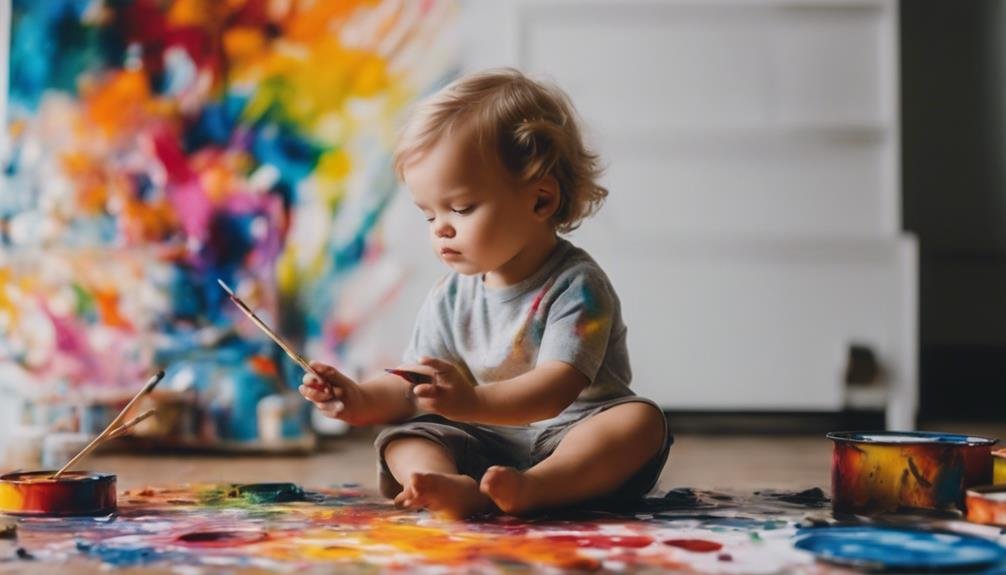
Exploring art and music with toddlers can significantly enhance their cognitive development by fostering creativity and improving problem-solving skills. Research has shown that engaging in artistic and musical activities helps toddlers develop critical thinking skills, spatial reasoning, and the ability to think outside the box. When toddlers are encouraged to experiment with different art materials, such as paints, crayons, and clay, they're learning to express themselves creatively while also honing their fine motor skills.
Moreover, introducing toddlers to different types of music can stimulate their brain development and enhance their cognitive abilities. Studies have demonstrated that music can improve memory, language development, and even mathematical skills in young children. By listening to various genres of music, toddlers can learn to recognize patterns, rhythms, and tones, which are essential for cognitive growth.
Emotional Expression Through Art
Understanding how toddlers express their emotions through art provides valuable insights into their cognitive and emotional development. Art serves as a tool for toddlers to communicate feelings that they may not yet have the verbal skills to express. Through colors, shapes, and textures, they can convey a wide range of emotions, from joy and excitement to frustration and sadness. By observing their artwork, caregivers and educators can gain a deeper understanding of a toddler's inner world, fostering a sense of connection and empathy.
| Emotion | Visual Representation | Example |
|---|---|---|
| Happiness | Bright colors and smiling faces | Sun shining in a blue sky |
| Anger | Sharp lines and dark colors | Jagged red lines |
| Sadness | Dull colors and droopy shapes | Raincloud over a flower |
| Excitement | Bold strokes and energetic patterns | Fireworks in a night sky |
Encouraging toddlers to express their emotions through art not only supports their cognitive development but also helps them build emotional intelligence and resilience. By providing a safe space for artistic expression, caregivers can empower toddlers to explore and process their feelings in a healthy and constructive manner.
Social Interaction Enhancement
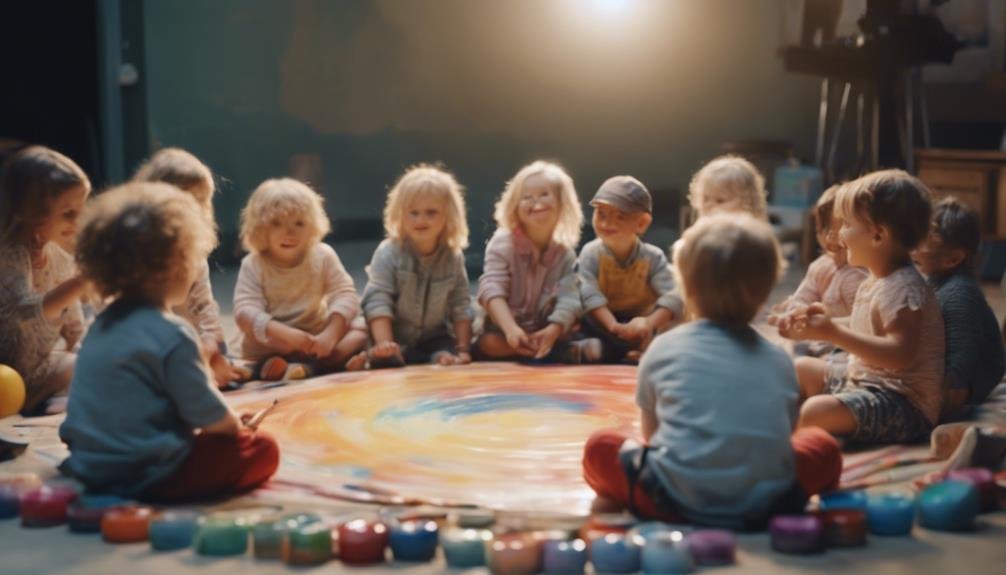
Observing how toddlers engage with art can provide valuable insights into how they interact socially with others, paving the way for discussions on enhancing their social interaction skills. By participating in art activities, toddlers learn to share materials, take turns, and collaborate on projects. These experiences help them develop important social skills like cooperation, communication, and empathy.
When toddlers work together on a painting or play musical instruments in a group, they learn to listen to each other, express their ideas, and respect different perspectives.
Research shows that engaging in artistic and musical activities can boost toddlers' confidence in social settings. Through art and music, toddlers can communicate their emotions and thoughts, leading to deeper connections with their peers. Encouraging group art projects or music sessions can create opportunities for toddlers to bond, build friendships, and learn to work as a team. These interactions not only foster social skills but also promote a sense of belonging and acceptance among toddlers, laying a strong foundation for healthy social development.
Sensory Stimulation Importance
Engaging in art and music activities with toddlers stimulates their senses, fostering cognitive development and enhancing their overall learning experience. Through sensory stimulation, toddlers are exposed to a world of new experiences that help them make sense of their surroundings. When toddlers engage in activities like finger painting, playing with musical instruments, or exploring different textures, they're actively using their senses of touch, sight, hearing, and sometimes even taste, which all contribute to their cognitive growth.
Research has shown that sensory stimulation plays a crucial role in shaping a toddler's brain development. By providing opportunities for toddlers to explore different sensory inputs, you're helping them build neural connections that form the foundation for learning and understanding abstract concepts later in life. These early sensory experiences also support the development of fine motor skills, language acquisition, and emotional regulation in toddlers.
Imagination and Creativity Boost
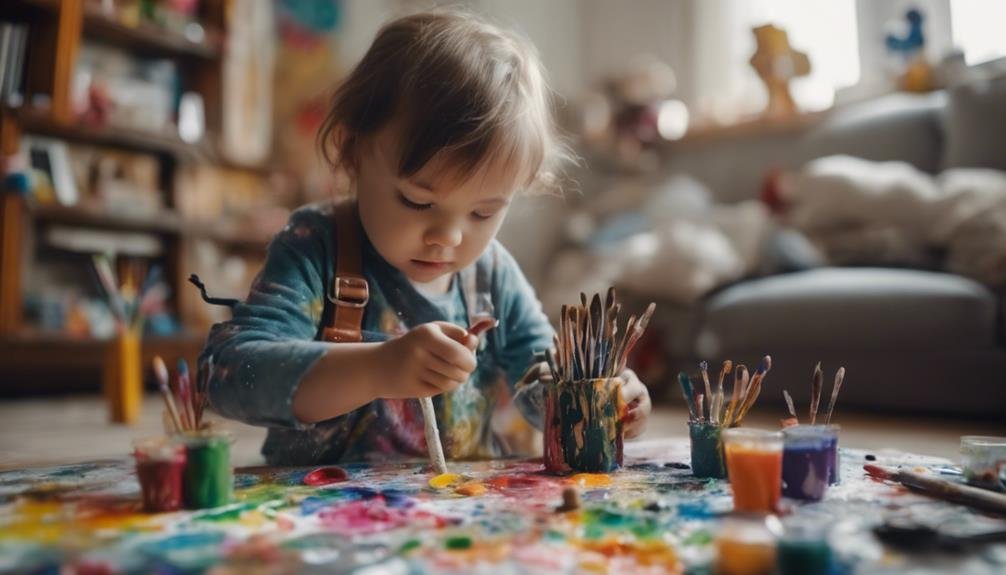
Stimulating a toddler's imagination and creativity through art and music activities is essential for their holistic development. Engaging in artistic and musical experiences allows your little one to explore, experiment, and express themselves in unique ways. Research shows that these activities can significantly enhance cognitive abilities, emotional intelligence, and social skills.
When your toddler paints a picture, dances to a melody, or plays with musical instruments, they're actively developing their imaginative thinking and creative problem-solving skills.
Encouraging your toddler to engage in art and music activities provides them with a safe space to unleash their creativity and explore the world around them. It fosters a sense of wonder and curiosity that's crucial for their overall development. Through artistic expression, your child learns to communicate their thoughts and feelings in non-verbal ways, promoting emotional awareness and self-expression.
Fine Motor Skills Development
Developing fine motor skills in toddlers is crucial for their overall physical and cognitive development. As they refine these skills, toddlers enhance their ability to perform tasks that involve precise movements of the hands and fingers, setting a strong foundation for future academic and life success.
Here are three ways in which focusing on fine motor skills can benefit your toddler:
- Hand-eye Coordination: Activities like drawing, painting, or playing with small objects help improve hand-eye coordination, which is essential for tasks like writing and using tools later in life.
- Strength and Control: Engaging in activities that require grasping, pinching, and manipulating objects helps toddlers build hand strength and control, laying the groundwork for skills like zipping up a jacket or tying shoelaces.
- Cognitive Development: Fine motor skills development is closely linked to cognitive growth, as it promotes problem-solving abilities, creativity, and spatial awareness in toddlers.
Language and Communication Skills
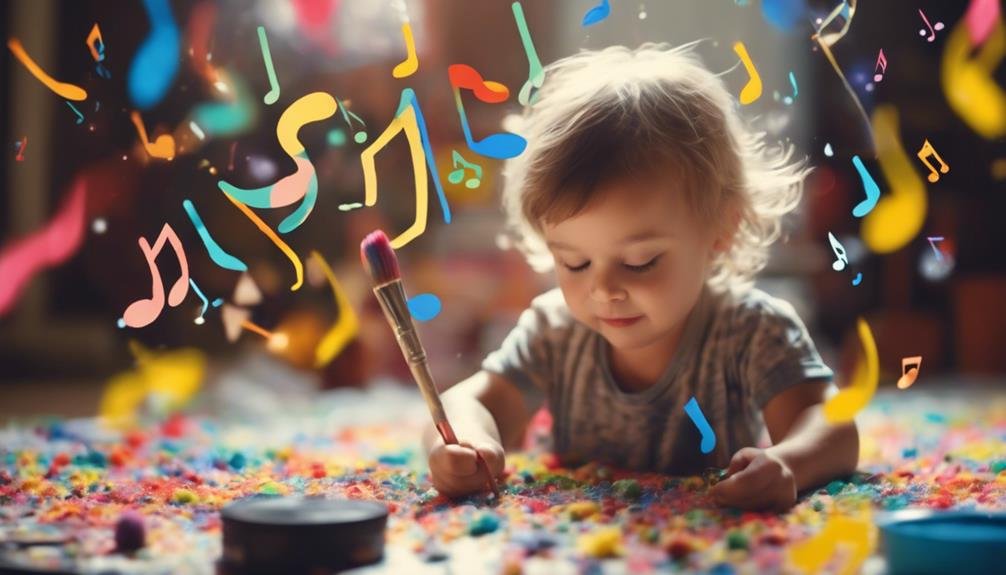
Improving language and communication skills in toddlers is essential for their overall cognitive development and future academic success. By engaging in art and music activities, toddlers can enhance their language abilities, vocabulary, and communication skills. Research shows that exposure to art and music at a young age can have a positive impact on language development, helping toddlers to express themselves more effectively and understand the nuances of communication.
| Benefits of Art and Music in Language Development | |
|---|---|
| Enhances vocabulary | Improves verbal skills |
| Encourages creativity | Boosts cognitive abilities |
| Fosters storytelling | Develops listening skills |
| Stimulates language processing | Strengthens social interactions |
| Supports emotional expression | Enhances comprehension skills |
Through art and music, toddlers can learn to communicate their thoughts and feelings, interact with others, and build a strong foundation for future language and literacy skills. Encouraging artistic and musical experiences in early childhood can significantly contribute to a child's language development and overall growth.
Self-Confidence and Self-Expression
Engaging in creative activities like art and music empowers toddlers to express themselves confidently and explore their inner emotions. Through art and music, toddlers can boost their self-confidence and develop a strong sense of self-expression. Here's how these activities can benefit your little one:
- Self-Confidence: When toddlers engage in art and music, they've the opportunity to make independent choices, experiment with different techniques, and see tangible results. This process helps build their self-esteem and belief in their abilities.
- Emotional Expression: Art and music provide toddlers with a safe outlet to express their feelings and emotions. Whether through colorful paintings or rhythmic beats, children can communicate their innermost thoughts in a non-verbal manner.
- Creativity: Encouraging toddlers to participate in creative activities fosters imagination and original thinking. This freedom to create without boundaries nurtures a sense of individuality and uniqueness in each child.
Cultural Appreciation and Awareness
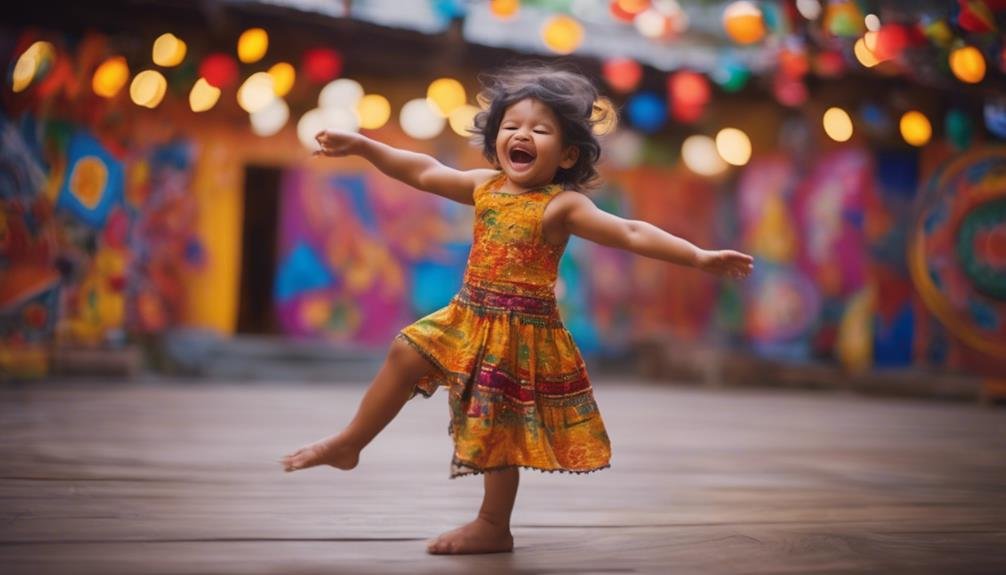
Exploring diverse cultural traditions through art and music can deepen your toddler's understanding of the world around them and foster a sense of appreciation for different ways of expression. By exposing your child to various artistic styles, musical genres, and traditional practices from around the globe, you're helping them develop a broader perspective and respect for cultural diversity.
Research suggests that early exposure to different cultural elements can enhance cognitive development, empathy, and cultural awareness in young children. For example, engaging with music from different cultures can help toddlers recognize patterns, improve their auditory skills, and even learn new languages. Similarly, exploring art from various traditions can stimulate creativity, inspire imagination, and promote critical thinking.
Encouraging your toddler to explore and appreciate diverse cultural expressions through art and music not only enriches their developmental journey but also instills values of tolerance, respect, and curiosity about the world. By fostering cultural appreciation and awareness from a young age, you're laying a strong foundation for your child to grow into a globally minded and empathetic individual.
Parental Involvement and Support
To support your toddler's holistic development, your active involvement and consistent support play a pivotal role in nurturing their exploration of art and music. Your encouragement and participation create a positive environment that fosters creativity and emotional expression.
Here are three ways you can enhance your toddler's development through art and music:
- Engage in Creative Activities Together: Spend quality time engaging in art and music activities with your toddler. Sing songs, dance, paint, or make music together to bond and stimulate their creative thinking.
- Provide Access to Diverse Artistic Experiences: Expose your toddler to a variety of art forms and musical genres. Take them to museums, concerts, or art classes to broaden their artistic horizons and inspire their creativity.
- Celebrate and Display Their Artistic Creations: Encourage your toddler's artistic endeavors by celebrating their creations. Display their artwork proudly in your home to show them that their efforts are valued and appreciated. Your support and involvement won't only boost their confidence but also nurture a lifelong love for art and music.
Frequently Asked Questions
Can Toddlers Become Overwhelmed by Too Much Sensory Stimulation?
Sometimes, toddlers can become overwhelmed by too much sensory stimulation. It's important to create balanced environments that cater to their needs. Pay attention to cues they give and provide opportunities for calming activities.
How Can Art and Music Help Toddlers With Problem-Solving Skills?
Engaging in art and music activities allows toddlers to explore creativity, think critically, and develop problem-solving skills. Through these experiences, toddlers enhance their cognitive abilities, improve focus, and learn to express themselves effectively.
Do Toddlers Need Natural Artistic Talent to Benefit From Art?
Do toddlers need natural artistic talent to benefit from art? Absolutely not! Art is about expression, exploration, and creativity. All toddlers, regardless of talent, can benefit from engaging in art activities, fostering imagination, and developing fine motor skills.
Is There a Specific Age to Introduce Toddlers to Different Art Forms?
When should you introduce toddlers to different art forms? While there's no strict age requirement, starting early exposes them to creativity. Simple activities like finger painting or listening to music can foster a love for the arts.
Can Art and Music Activities Replace Traditional Learning Methods for Toddlers?
Yes, art and music activities can enhance traditional learning methods for toddlers, fostering creativity, emotional expression, and cognitive development. They offer a dynamic approach that engages multiple senses, promoting holistic growth and a love for learning.
Conclusion
So, next time you're wondering how to support your toddler's development, remember the power of art and music.
How can you help your little one grow and thrive through creativity and expression? By engaging in artistic activities together, you can nurture their cognitive, emotional, and social skills while fostering a love for the arts.
Your involvement and support make a world of difference in shaping their holistic development. Keep creating and exploring together!


